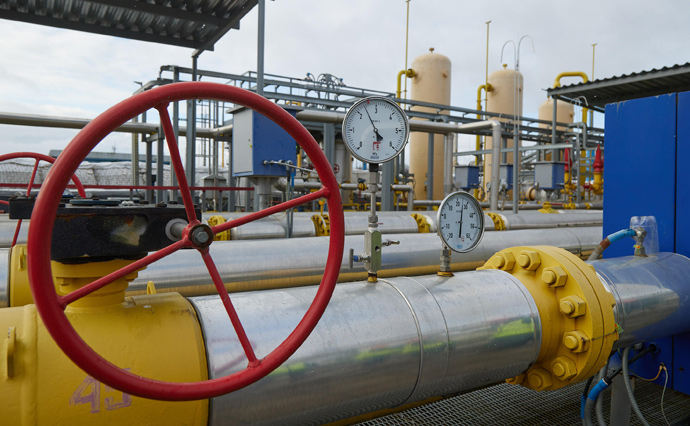
How Ukrainian gas storage facilities will help the EU to become energy-independent from Russia
What does European certification of Ukrainian gas storage facilities mean and what will Ukraine get from it?
“Ukraine’s underground gas storage facilities are the largest in Europe. Their total capacity is close to 29% of the capacity of all gas storage facilities in Europe, and their resources can become a pillar of support for the EU’s energy security”
Oleksiy Chernyshov, CEO of Naftogaz Group
Against the Russia’s blackmail, the European Commission is implementing its REPowerEU Plan, an initiative aimed at ending EU’s dependence on the Russian gas until 2030 in response to Russia’s full-scaled armed aggression against Ukraine.
EU countries have decided to take step to increase security of gas supplies, create reserves for crisis situations and accumulate the necessary gas stocks to ensure stable passing of the heating season. Last year, Brussels set the minimum level of reserves at the storage facilities for the winter period for the first time. For 2023, this level is at least 90% of the gas storage facility capacity.
The key requirement for the storage facilities is to be independent from the entities linked to Russia. Therefore, all operators must pass certification and prove it. Ukrtransgaz, the operator of Ukrainian UGS facilities as part of Naftogaz Group, was among the first companies to officially launch the international certification procedure under the new procedure and the second UGS facility operator in Europe to successfully pass the certification.
Oleksiy Chernyshov, CEO of Naftogaz Group, believes that this will provide an opportunity for Ukraine to store gas for the EU countries in its UGS facilities and thus become an important element of the energy security of Europe.
What possibilities does this open for Ukraine and what role could our gas storage facilities play in the EU energy security, and what will Ukraine receive from it?
Possibilities of Ukrainian UGS facilities
Ukraine has 12 UGS facilities with a capacity of 31 billion cubic meters. 10 of them have been created on the basis of exhausted gas deposits and two in the water-bearing underground horizon.
The capacities of underground gas storage facilities are located in the western, central, southern and eastern parts of Ukraine. The biggest cluster of UGS facilities is located in the west of the country, accounting for around 80% of the underground storage capacities of the entire Ukraine. The location of gas storage facilities near borders makes gas storage more convenient for EU countries.
In 2020, Ukrainian UGS facilities were 90% full. In other years, the indicator ranged within 50-60%.
Considering reduction of gas consumption in Ukraine because of the war, the demand for gas for internal needs of the country will decrease even further before the winter of this year, which means that Ukraine will be able to offer uncommitted capacities of the its UGS facilities to neighbouring countries.
“Ukraine can provide European countries with up to 10 billion cubic meters of free space in the UGS facilities for preparing for the heating season”
Oleksiy Chernyshov, CEO of Naftogaz Group
This is particularly relevant for European consumers, which were earlier dependent on direct gas supplies from Russia and did not have enough capacity to store gas. For example, Poland can store around 15% of its annual needs for gas. Lithuania, Estonia and Moldova do not have underground gas storage facilities.

Gas in underground storage facilities
Last year showed that accumulating gas reserves in underground storage facilities in advance is the best way to have sufficient gas supplies in winter.
Therefore, in June 2022, the European Parliament approved a new regulation setting the minimum level of reserves at the storage facilities at 80% before 1 November 2022. For the next two years, this level is at least 90% of the gas storage facility capacity.To resolve the issue, the EU introduced mandatory certification procedure for the operators of gas storage facilities. The main goal of certification is to prove that third parties, particularly representatives of Gazprom or other Russian beneficiaries, do not have influence on the operators of underground gas storage facilities. Fluxys Belgium N.V. was the first company to pass the procedure.
What does certification mean for Ukrainian UGS facilities?
JSC Ukrtransgaz, the operator of Ukrainian UGS facilities, became the second company in the EU to certify its facilities under the new procedure.
On April 7, the National Commission for State Regulation of Energy and Public Utilities (NEURC), upon the approval of the EU, has approved the final decision on the certification of JSC Ukrtransgaz in accordance with the European rules of gas supplies security.
The decision was approved quickly thanks to coordinated work of JSC Ukrtransgaz and NJSC Naftogaz, MPs, NEURC and Energy Ministry.The law on certification of the operator of gas storage facilities took force 1 January 2023, and on January 24, NEURC passed a bylaw – the Regulation on the Procedure of Certification of the Operator of Gas Storage Facilities. On January 27, JSC Ukrtransgaz submitted an application for certification.
“The preliminary decision on the certification was passed on the 23rd working day instead of the 60 working days prescribed by law. Although the European rules for the EC Secretariat and the national regulator generally provide no more than 50 working days between the preliminary and the final decision, thanks to the responsible position and urgent actions of the Commission the procedure was completed in half the time”
Roman Maliutin, CEO of JSC Ukrtransgaz.
Certification confirms the right of Ukrtransgaz to store gas not only of Ukrainian companies, but also of non-resident entities. Also, Ukraine gain the official right to store not only commercial gas of European companies in its underground gas storage facilities, but also gas reserves formed for crisis situations by EU countries. Without certification, Ukrainian UGS facilities would have lost the opportunity to work with gas from EU countries and non-resident companies.
Enhancement of cooperation with the EU will provide an opportunity to load the capacities of the Ukrainian UGS facilities to the maximum and significantly increase the profit from the operation of gas storage facilities for Ukraine. This is also beneficial for European consumers, because the tariffs for gas storage in Ukrainian underground gas storage facilities are lower than in EU countries.
“The tariffs for gas storage in the Ukrainian UGS facilities remain at a very “attractive level”. They are the lowest in Eastern Europe and are still more beneficial than those charged by our European colleagues, even with the transportation costs”
Oleksiy Chernyshov
Additional revenues from storage of larger volumes of gas than in previous years will increase the competitiveness of underground storage facilities and provide proceeds to the state budget. This will also strengthen the energy security not only of Ukraine, but also of European partner countries.

Military risks and warranties for companies
Before the start of the war, over 100 companies from Europe, USA and Asia, and more than 800 Ukrainian companies stored gas in Ukrainian underground gas storage facilities.
After February 24, most foreign companies exhausted their gas reserves, which were stored in the “customs warehouse” regime, and practically did not pump new volumes of gas, considering geopolitical risks related to Russia’s invasion of Ukraine.
The year of war has shown that it is safe to store gas in Ukrainian underground gas storage facilities. A few months after the introduction of martial law, some foreign companies showed interest in cooperation with the Ukrainian operator of UGS facilities again.
Last year, Ukrtransgaz did not reject any nomination of the clients and did not once refer to force majeure circumstances despite all the challenges, says Roman Maliutin. At the moment, a possibility of introduction of financial guarantees is being considered to eliminate war-related risks. the EU can provide multilateral financial guarantees again war-related risks for companies planning to store their gas in Ukrainian UGS facilities. This was one of the issues discussed in detail during the meeting of Oleksiy Chernyshov, CEO of Naftogaz Group, with the European Commissioner for Energy, Kadri Simson, in Brussels.
Ukrtransgaz and Naftogaz are now working together on the idea of creating an Eastern European gas hub in Ukraine. The technical possibilities for this are already available. A cluster of large-capacity underground gas storage facilities with a good geographical location near the borders will become an integral part of the energy security of Ukraine and the united Europe in the near future.
Media, Publications
-
Deputy Ambassador of the EU on enlargement, reforms and €190 billion in support
-
EU membership in 2030? Deputy Ambassador of the EU answers students’ questions
-
How does the EU take decisions on Ukraine? Subsidiarity, unanimity and consensus among 27 countries
-
What reforms does Ukraine still need to join the EU? Deputy Ambassador of the EU answers
-
How can Ukrainian students become more involved in EU programmes and projects? Deputy Head of the EU Delegation answers
-
Are there alternatives to European integration if the road to the EU is long? Deputy Ambassador of the EU answers